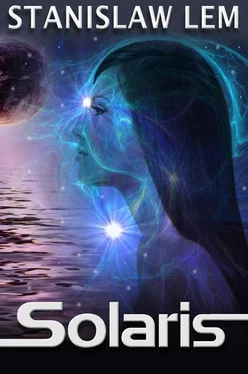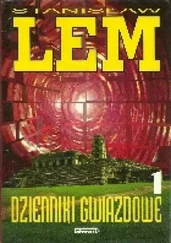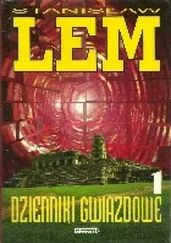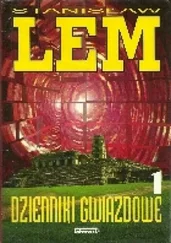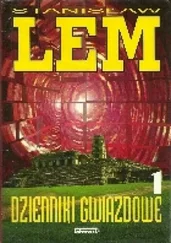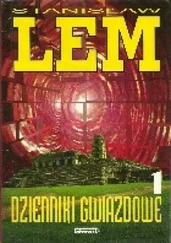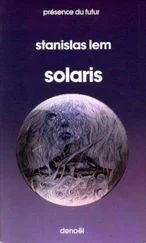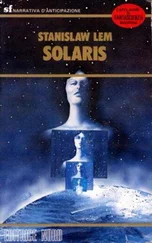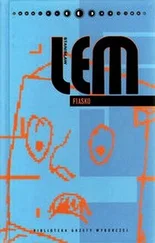“Solaris Station. Zero and zero. Docking complete. Over and out,” came the lifeless voice of the control mechanism. With both hands (I could sense a vague pressure on my chest, and my innards felt like an irksome burden) I took hold of the grips directly opposite my shoulders and disconnected the cables. A green sign reading EARTH came on, and the side of the capsule opened. The pneumatic berth pushed me gently in the back, so that in order not to stumble I had to take a step forward.
With a soft hiss like a resigned sigh the air left the coils of the space suit. I was free.
I stood beneath a silver funnel high as a nave. Bundles of colored pipes led down the walls, disappearing into circular wells. I turned around. The ventilation shafts were roaring, drawing in what was left of the poisonous atmosphere of the planet that had gotten in during the docking. The cigar of the capsule, empty as a burst cocoon, stood in a concavity set into a steel platform. Its external plating had been scorched to a dirty brown color. I walked down the short ramp. Beyond it, a layer of rough plastic had been welded to the metal deck. It had worn away in places from the wheels of the mobile rocket jacks. The air conditioning compressors suddenly went off and there was complete silence. I looked around somewhat helplessly; I’d expected someone to appear, but nobody had come. There was nothing but a glowing neon arrow indicating a soundless moving walkway. I stepped onto it. The ceiling of the hangar curved down in an elegant parabola that became the tube of a corridor. In its alcoves there were heaps of pressurized gas cylinders, containers, annular parachutes, crates, all in disorderly piles, any old how. That made me think, too. The walkway ended at a point where the corridor widened into a circular space. Here there was an even bigger jumble. Under a mound of metal canisters an oily fluid had leaked and formed a puddle. A strong, unpleasant odor filled the air. Boot prints marked clearly in the sticky substance led in different directions. Among the cans lay rolls of white telegraph tape, torn papers, and trash, all of which looked as if it had been swept out of the cabins. And there was another illuminated sign directing me to the middle door. It led to a corridor so narrow that two people could barely have passed one another. Light came from high-placed windows with biconvex panes directed at the sky. There was another door, painted with a green-and-white checkerboard. It was ajar. I entered. The semi-spherical cabin had one large panoramic window in which the mist-covered sky was aglow. Down below, the blackish hills of the waves moved soundlessly. There were numerous open cabinets around the walls. They were filled with technical instruments, books, glasses with a dried residue at the bottom, dust-covered thermos flasks. Around the dirty floor there were five or six mechanical tables on wheels, and among them several armchairs that were deflated and sagging. Only one was blown up, its backrest leaning to the rear. In it sat a small, scrawny man with a sunburned face. The skin was peeling from his nose and cheekbones. I knew who he was. It was Snaut, Gibarian’s second-in-command, a cybernetician. In his time he’d published a number of highly original articles in the Journal of Solaristics . I’d never met him in person before. He was wearing a mesh shirt, tufts of gray hair on his flat chest poking through, and once white linen pants with multiple pockets like a mechanic’s, stained at the knees and burned from reagents. He was holding a plastic bulb of the kind used to drink out of on ships that lack artificial gravity. He looked at me as if he’d been dazzled by a blinding light. The bulb fell from his fingers as they unclenched, and bounced a couple of times on the floor like a ball. A splash of clear liquid spilled from it. The blood drained slowly from his face. I was too taken aback to say anything, and this wordless scene continued until in some mysterious way his fear was transferred to me. I took a step forward. He shrank into his armchair.
“Snaut,” I whispered. He winced as if he’d been struck. Staring at me with inexpressible aversion, he said hoarsely:
“I don’t know you, I don’t know you, what do you want…?”
The spilled liquid evaporated quickly. I caught the smell of alcohol. Was he drinking? Drunk? But why was he so afraid? I was still standing in the middle of the cabin. My knees were wobbly, and my ears felt like they’d been stopped up with cotton wool. The pressure of the floor beneath my feet still didn’t seem entirely reliable. Outside the convex window the ocean was moving evenly. Snaut kept his bloodshot eyes on me. The fear was leaving his face, but the unutterable disgust remained.
“What’s wrong with you?” I asked in a murmur. “Are you sick?”
“You’re concerned…,” he said in a hollow voice. “Aha. So you’re going to be concerned? But why about me? I don’t know you.”
“Where’s Gibarian?” I asked. For a moment he held his breath, his eyes glassed over, something lit up in them and went out again.
“Gib… Gibar… no! no!!”
He shook with soundless, idiotic laughter, then abruptly fell silent.
“You’ve come to see Gibarian…?” he said almost calmly. “Gibarian? What do you mean to do with him?”
He was looking at me as if all at once I’d ceased to be a threat to him; in his words, and even more in their tone, there was something hateful and offensive.
“What are you talking about,” I stammered, feeling dazed. “Where is he?”
He was stunned.
“You don’t know…?”
He’s drunk, I thought to myself. Drunk to the point of unconsciousness. I was growing increasingly angry. I really ought to have left, but I ran out of patience.
“Get a grip on yourself!” I roared. “How am I supposed to know when I just flew in a moment ago! What’s the matter with you, Snaut!!”
His jaw dropped. Once again he held his breath for a second, but in a different way, and a sudden glint appeared in his eye. He gripped the armrests of the chair with trembling hands and stood up with difficulty, his joints cracking.
“What?” he said, almost soberly. “You flew in? From where?”
“From Earth,” I replied, furious. “Maybe you’ve heard of it? Though it doesn’t look that way!”
“From Ear… Good grief… So you’re… Kelvin?!”
“That’s right. Why are you looking at me that way? What’s strange about that?”
“Nothing,” he said, blinking rapidly. “Nothing.”
He wiped his forehead.
“Kelvin, I’m sorry, it’s nothing, you know, just the surprise. I wasn’t expecting you.”
“What do you mean, you weren’t expecting me? You were informed months ago, and Moddard telegraphed today, from the Prometheus …”
“Right. Right… No doubt. It’s just that here, as you can see, there’s a certain amount of… confusion.”
“No kidding,” I retorted drily. “It’s hard not to notice.”
Snaut walked around me as if he wanted to check out the look of my space suit, which was the most ordinary kind, with its harness of pipes and cables on the chest. He gave a series of coughs. He rubbed his bony nose.
“Maybe you’d like to take a shower…? It’ll do you good. It’s the blue door across the way.”
“Thanks. I know the layout of the Station.”
“Are you hungry maybe…?”
“No. Where’s Gibarian?”
He went up to the window as if he hadn’t heard my question. With his back turned he looked much older. His close-cut hair was gray; the back of his neck, burned by the sun, was crisscrossed with wrinkles deep as cuts. Outside the window the crests of the waves glistened, rising and falling so slowly it seemed as if the ocean was congealing. Looking down there I had the impression the Station was moving imperceptibly sideways, as if it were slipping off an invisible base. Then it returned to equilibrium and tipped lazily in the other direction. But it was probably an illusion. Stretches of slimy foam the color of bone were gathering in the troughs between the waves. For a split second I felt a twinge of nausea in the pit of my stomach. The cold orderliness of the Prometheus now seemed to me something precious and irrevocably lost.
Читать дальше
